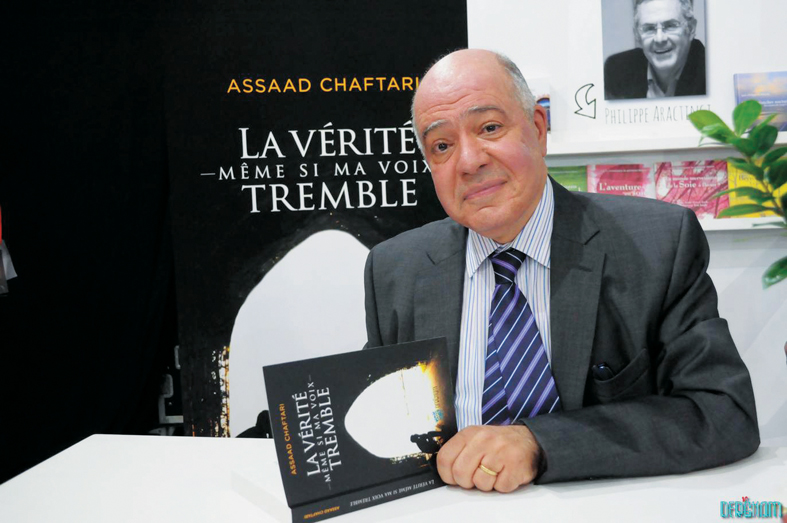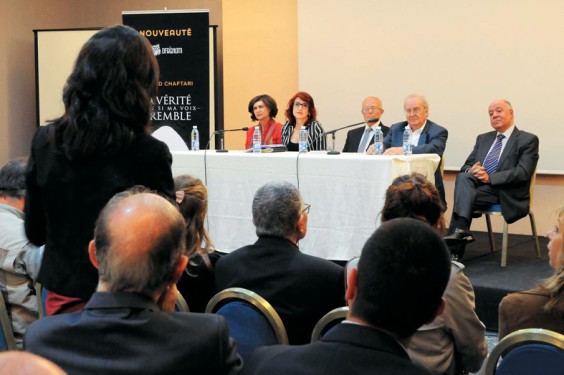Prestige issue 271, february 2016
«The book is a message of hope that I have experienced and that I hope to share with others»
In his book «La Vérité même si ma voix tremble», Assaad Chaftari, former No. 2 of Kataeb intelligence services during the civil war and current activist, member of movements, NGOs and the coalition Wahdatouna khalasouna, makes his public mea -culpa and advocates for change at personal level, dialogue and non-violence, to save the country. A universal message of hope, that he delivers to Prestige.
The author of the book, Assaad Chaftari. © Archives Assaad Chaftari.
You wrote a public letter of pardon in 2000 where you expressed your regrets following the atrocities of the civil war. You also released your film «Sleepless Nights» in 2013. What still drives you to publish a book? The «Sleepless Nights» movie is not «my movie». It is that of Miss Eliane Raheb that reflects her way of seeing things, and that somehow distorted my message. This movie rather addresses the problem of missing persons,this issue continues to make families of more than 17,000 missing people suffer and their hearts bleed according to figures of the Lebanese state. This book like my apology letter, bear my signature. I think I never talked about the important things this book unveils. This is not a shocking message, but rather a message of hope that I lived and that I hope to share with others.
«La Vérité même si ma voix tremble». Why this title? What can shake Assaad Chaftari today? I suggested a long list of titles that speak of abyss, of crossing the desert, of change, of hope, and many other themes treated in the book. In agreement with the publisher Dergham, we finally chose from the list the actual title. There are difficult truths to confess such as personal and intimate flaws, or abuses perpetrated personally during a civil war or the act of killing with your own hands. There is also the fact that I try to understand my personal, political and military life from another angle. I had to try to speak only of myself but in a minefield, we cannot always decide what mine will explode. Is it only yours or that of others? Who are those people with whom I worked and I do not want in any way to accuse them of anything. Than there is the problem of breaking taboos and this pact of silence that followed the end of hostilities, due in my opinion to the various traumas of the war and the disgrace of having been violent and even supra-violent.
What was the trigger? When and how did you decide to admit your faults and request pardon? From my painful experience of change, I know it’s not a question of trigger. It is rather a journey that triggers a beginning of change. As I counted in the book, God has placed in my path in 1988 a group called the Moral Rearmament known today under a new name Initiatives of Change. They preach personal change as a must for hope to change the world while comparing our life with four moral criteria, which are: absolute honesty, absolute purity, absolute unselfishness and absolute love at last. They also claim that God-if one is a believer- if not consciousness guide us if we want so, to the right path and inspire us the necessary acts to change ourselves and change a little bit the things around us and in our society.
If you were called upon to bear arms today, would you be willing to do it? If you refuse, won’t you be considered as a traitor refusing to defend his own country? A very random question, to which I have an answer. We must differentiate between the fact of bearing arms against an invading enemy from a foreign country and carrying weapons to kill people that are fellow citizens like brothers. I will never take up arms because they never solved anything and violence turns against its players. If not immediately, it will affect future generations. The dialogue has never killed anyone, mutual concessions in the interest of all either.
Roundtable on the book of Assaad Chaftari. © Archives Assaad Chaftari.
If the course of events had turned in your favor, would you have done today your mea culpa?Another random question to which I don’t have an answer. Firstly let me place a precision. I may have lost militarily in the Christian camp. But overall I, with many others, won because the Taif agreement that ended the civil war was a bad copy of the tripartite agreement signed in December 1985 that I co-negotiated on behalf of the Lebanese Forces then and that was canceled by a coup that took the lives of hundreds of people. I had lost some Christians who later joined the Taif Accord but we have won the rest of the Lebanese. I believe that overall I am in the clan of winners. And for the causes of justice and peace, one must be prepared to lose everything in order to win. I think I was covered with Divine Mercy for this to be my case. Note that on some level I was still the hero you’re talking about, even after the end of the war, but for my family. I had to be at the service of all Lebanese. When one becomes aware of his mistakes,he commits a more important sin by remaining silent. If our governments have done nothing either in normal or transitional justice nor in understanding reasons of a fratricidal war, or at the level of a real reconciliation -not an eclectic reconciliation between politicians- we can, on the civil society and citizens levels, go through this purgatory. I said «we can» but I correct myself immediately: «we must»!
Does today’s youth remind you of that of 1975?A Message … Sectarianism is from bad to worse. The vertical division of the country into two coalitions, the disastrous division between Sunnis and Shiites, social problems, the weakness of the central government that is breaking records and wars around us are surely not the right ingredients for the appeasement of the spirits or for the establishment of stability in the country. Media means, all partisans, are much more numerous and virulent than during the civil war. Yes I admit that the situation is serious but not hopeless. To the youth I would say: do not let others decide for you, do not lose your critical mind, and go check the hearsay that speak ill of others. Get out of your comfort zone to discover that the other is as human as you, who may have other political views than yours but he is waiting for you.
Tell us about your activities … When I started waking up, I was surprised to know that many NGOs had started working for civil peace during the war with all the incumbent risks. Today a myriad of other NGOs have emerged. I am still part of Initiatives of Change / Moral Rearmament. This movement with 31 other NGOs is a member since 2008 of a coalition that we called Wahdatouna khalassouna or our unity will save us. Two years ago, following the hostilities in Tripoli, we were several ex-combatants from different enemy militias to form a new association under the name of Combatants for Peace. All these organizations have mainly aimed to immunize society -and especially youth- against violence from the many visits to schools, universities and certain political parties and other organizations. We travel all over the country. Many documentaries and other materials are available to young people or their educators. We organize meetings to share about our personal experiences before, during and after the war, but also workshops on forgiveness, violence, dialogue, conflict transformation, or non-violent communication. Sometimes we program a play, etc. I meet groups of young Palestinians but also young Syrians.
Are you planning to translate your book in other languages? The book is being translated in Arabic. I was asked to do the same to English but everything will depend on the demand, even if I am aware that the message conveyed through the book is universal.
Where can we find your book? The book can be found all over Lebanon, especially in major bookstores but also in the suburbs of Beirut and regions as Kaslik, Bikfaya and soon Zahle. You can also order it online via the website of Antoine online.
Do you have a message to the Lebanese? The country’s situation is not hopeless if you participate in change starting with yourself. We as individuals can deal with the impairment of our governments by taking the necessary initiatives to change the state of things, but to reach our goals, we should remain united and work in the interests of all, because if one community is weak, all Lebanon will become ill. Interview by MIREILLE Bridi BOUABJIAN







